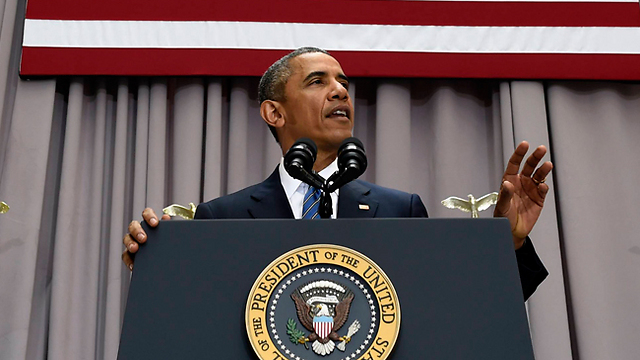US president delivers speech at university defending nuclear agreement, saying that alternative to diplomacy is war.
President Barack Obama said Wednesday that every country that has commented on the Iran nuclear deal has supported it — except for Israel. Obama singled out Israel’s government in a speech about the deal at American University. He described opponents of the deal as outliers and noted that the deal has support from non-proliferation experts and former ambassadors from both political parties.
“A nuclear armed Iran is far more dangerous to Israel, to America, and to the world than an Iran that benefits from sanctions relief,” said the president. “I recognize that prime minister Netanyahu disagrees, disagrees strongly. I do not doubt his sincerity, but I believe he is wrong. I believe the facts support this deal.”
Asserting that claims about dangers allegedly posed by the deal are overblown, Obama said that “there is no scenario where sanctions relief turns Iran into the region’s dominant power. Iran’s defense budget is eight times smaller than the combined budget of our Gulf allies. Their conventional capabilities will never compare to Israel’s, and our commitment to Israel’s qualitative military edge helps guarantee that.”

The president also said the choice on the Iran nuclear deal is between diplomacy and some form of war. He said that if Iran fails to abide by the deal, it’s possible the US would have no alternative to using military force against Iran. He said he hasn’t shied away from using force when necessary, pointing out that he’s ordered military action in seven countries and has sent thousands of American troops into battle.
But Obama added that the US can’t justify war in good conscience before testing a diplomatic agreement that could meet its objectives.
Obama framed the deal as the nation’s most consequential foreign policy debate since the authorization of the Iraq war, a now unpopular decision that still reverberates through American politics. He argued that the people who supported the Iraq war now oppose the diplomatic deal with Iran.
The president stated that the Iran nuclear accord builds on an American tradition of “strong, principled diplomacy” with adversaries, including the former Soviet Union.
The president launched a detailed explanation of how and why the US and international partners reached a landmark agreement that aims to curb Iran’s nuclear program in exchange for billions of dollars in relief from sanctions. Walking through components of the lengthy agreement, he said all of Iran’s pathways to a bomb would be cut off.
“This is the strongest nonproliferation ever negotiated,” he declared.
Obama also said that a block of the Iran nuclear deal by US lawmakers would accelerate Iran’s path to a nuclear weapon. He argued that Iran will be more capable of building a nuclear weapon if the deal is blocked and a military solution will only drive its nuclear development deeper underground.
“What’s more likely to happen should Congress reject this deal,” Obama said, “is that Iran would end up with some form of sanctions relief without having to accept any of the constraints or inspections required by this deal. So in that sense, the critics are right. Walk away from this agreement, and you will get a better deal – for Iran.”
The president also argued that many of the criticisms, which are made widely by Republicans in Congress, can be attributed to “knee-jerk partisanship” and spread false fears about the deal, which lawmakers are set to vote on next month.
Obama’s address was part of an intense summer lobbying campaign by both supporters and opponents of the nuclear deal. Members of Congress will vote next month on a resolution either approving or disapproving the pact.
The backdrop for Obama’s speech was meant to link the nuclear accord to a long tradition of American diplomacy, often conducted with unfriendly nations. He spoke at the same university where President John F. Kennedy made a famous call for Cold War diplomacy and nuclear disarmament.
As reported by Ynetnews
